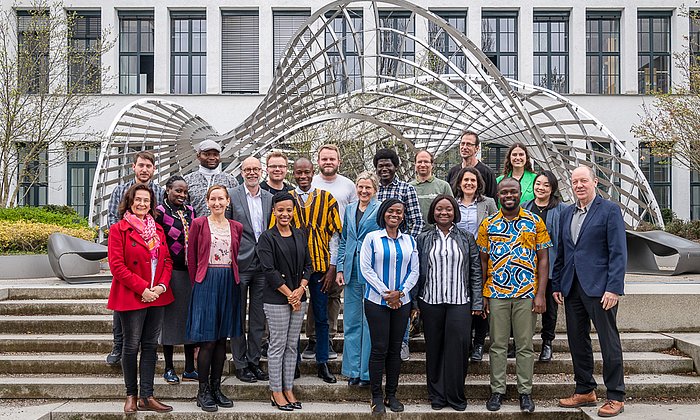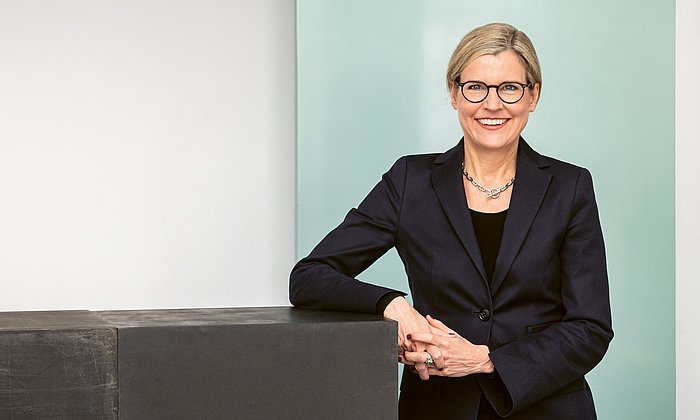Festive Dies Academicus of TUM
President Hofmann thanks the TUM family for a successful year

President Hofmann emphasized that 2023 was a very successful year for TUM. Bucking the trend at universities across Germany, the number of students rose to 52,000 - another new record and a doubling since 2010. 36% of students are now female - an increase of 119%. And 44% of all students are of international origin.
TUM's economic impact
Hofmann also emphasized the positive influence of TUM on the economic location: 77% of graduates from TUM work in Germany - and as many as 55% of international alumni remain here as excellently trained specialists. Added to this are the numerous successful start-ups in the TUM ecosystem. There are currently 12 unicorns - each with a market value of more than 1 billion US dollars - that were founded by TUM alumni.
With 810 active start-ups, TUM is far ahead of all universities and scientific organizations in Germany - but more is needed, Hofmann emphasized: "Of course, things are going better here in Bavaria than elsewhere in Germany. But success is relative to the reference point - and that is abroad! That's why we need to become even more ambitious." This is why the state must also think more carefully about where it uses its funds: "Every state-funded budget position at TUM creates 14 new jobs via our start-ups."
Better pay for university staff and dormitory construction
At the same time, Hofmann lamented the inadequate pay of university employees, who contribute significantly to the success of TUM. "They form the backbone of TUM - even if it is currently being severely bent. Inflation is driving up the cost of living. The rigid corset of the collective wage agreement of the federal states gives us no opportunity to act in a performance-oriented manner. We are experiencing a new "brain drain" from future-oriented universities to municipalities that can pay significantly better. Political action is urgently needed here for more performance-related pay," demanded the TUM President.
Student representative Isabella Hennessen and President Hofmann agreed in calling for the accelerated construction of apartments for students. Hennessen warned: "The lack of housing is an obstacle that prevents talented people from coming to Munich. More needs to happen here! This is one of the most pressing problems." Hofmann appealed to the state government to make plots of land available at low cost so that the 12,000 additional homes needed could be built with the help of private investors.
TUM Global South Initiative
As part of its new Global South Initiative, TUM strategically expands its relationships with research institutions in South America, Asia, and Africa. One of the most important partner universities is KNUST from Ghana. Its Vice-Chancellor, Prof. Rita Dickson, gave an insight into her perspectives as a guest speaker. Dickson sees the main task of universities as improving people's quality of life and training the next generation of innovative leaders. These leaders must be courageous, resilient, and creative, but above all, they must have emotional intelligence.
Dickson also praised KNUST's five-year partnership with TUM as a great success story. There are numerous joint research and teaching projects, he said. "We are stuck together for life," exclaimed Dickson.
Three TUM initiatives active in the Global South presented their projects at the Dies Academicus:
TU eMpower Africa is a student-run association that aims to supply villages in rural areas with renewable energy to improve living conditions and economic productivity.
The TUM SEED Centers are active in numerous countries and try to bundle ideas for economic growth, start-ups, and sustainable infrastructure. The aim is to continuously expand practical knowledge through multicultural and multidisciplinary cooperation. Representatives from all eight SEED Centers participated in the Munich annual celebration.
TUM.ai is a student initiative that attempts to use artificial intelligence (AI) to solve particular challenges faced by people in the Global South. They are committed to a world in which AI is not the privilege of a few states but a tool for all people.
Prizes and awards
As part of the Dies Academicus, also this year important awards were presented:
Senior Vice President Prof. Gerhard Kramer presented TUM's highest award, the Heinz Maier-Leibnitz Medal, to two outstanding female scientists.
As chair at TUM and head of the Fraunhofer Institute for Applied and Integrated Security AISEC, Prof. Claudia Eckert deals with protecting IT systems against hacker attacks. She also advises companies and the public sector on IT security issues.
Prof. Sandra Hirche conducts research at TUM on the security of robots when interacting with humans. Kramer emphasized that Hirche has done "groundbreaking work" as an information-oriented control and systems theory expert.
TUM Senior Vice President Prof. Claudia Peus honored the TUM Alumni and founders of Isar Aerospace, Daniel Metzler and Josef Fleischmann, as TUM Entrepreneurs of Excellence. As a commercial provider, their company builds rockets to transport small and medium-sized satellites into space.
Peus praised the two founders as "particularly inspiring entrepreneurial personalities" who actively pass on their knowledge and experience to the next generation in the TUM start-up ecosystem.
The TUM Sustainability Award went to political scientist Prof. Miranda Schreurs. The TUM professor at the Munich School of Politics and Public Policy deals with climate policy. Vice President Prof. Werner Lang, last year's award winner himself, highlighted Schreurs' role in the search for solutions.
Schreurs expressed her thanks for the award and, at the same time, warned: "The world is still on the wrong track." At present, a catastrophic global temperature rise of 3 degrees is still to be expected. However, the climate researcher was optimistic that the global community could still succeed in averting this: "We can do it together!"

This year's Dies Academicus was accompanied by music from the TUM JazzBand, made up of students.
Technical University of Munich
Corporate Communications Center
- Ulrich Meyer
- presse@tum.de
- Teamwebsite
Contacts to this article:










![[Translate to English:] Präsident Thomas F. Hofmann beim Dies Academicus 2022. [Translate to English:] Präsident Thomas F. Hofmann beim Dies Academicus 2022.](/fileadmin/user_upload/20221201_Dies_Academicus_AE_-298.jpg)

